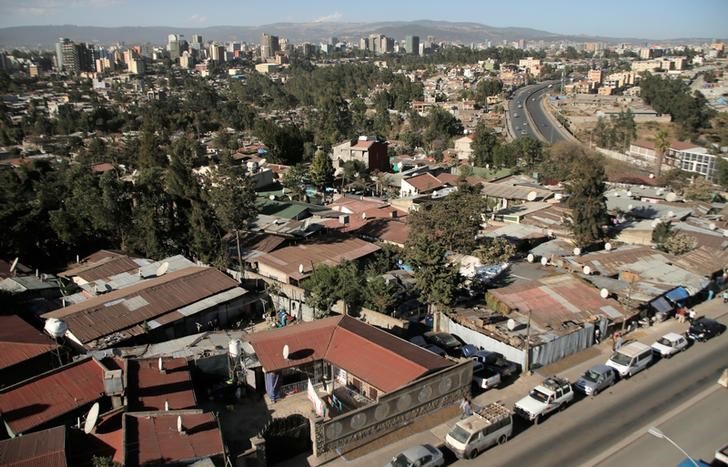Nairobi, Kenya/Addis Ababa, Ethiopia
Thomson Reuters Foundation
Scores of Ethiopian families are at risk of contracting the new coronavirus after authorities demolished their makeshift houses and left them homeless, human rights groups said this week.
Authorities in the capital began destroying the informal settlements near Bole International Airport in February.

An aerial view of Addis Ababa, Ethiopia February 15, 2018. REUTERS/Tiksa Negeri
They say the settlement in Addis Ababa, home to more than 1,000 people, is illegal. Residents – mostly casual labourers who have lost their jobs due to COVID-19 restrictions – say they bought the land in 2007 and have the documents to prove it.
“Having a home is critical to protecting oneself from COVID-19, stopping its spread and recovering from it,” said Deprose Muchena, Amnesty International’s director for East and Southern Africa.
“The authorities must ensure that no one is put in a position of increased vulnerability to COVID-19 including by rendering them homeless.”
Around the world, homeless communities and residents in slums and informal settlements are particularly at risk of the virus, as limited access to water and overcrowding turn hand-washing and social distancing into a luxury.
Muchena said parents and young children were now sleeping rough, in the cold and rain, with no place to go and at heightened risk of catching and spreading the deadly virus.
The East African nation declared a state of emergency to help curb the virus on 8th April. Home to some 110 million people, Ethiopia has recorded 130 cases and three deaths.
Land grab in a crisis
City authorities say some Ethiopians are now abusing the global crisis to seize land that is not theirs.
Addis Ababa Mayor Takele Uma Banti told the Thomson Reuters Foundation the forced evictions aimed to stop people migrating to the capital and grabbing land from farmers and government.
He said people had used the pandemic to build houses while authorities’ attention was set on enforcing social distancing.
“Demolition will continue because these buildings are informal, it is a source of land grabbing,” Takele said, noting that similar demolitions were happening across Addis Ababa.
In Ethiopia, all land is owned by the state.
While buying and selling it is illegal, long-term leases can be bought from the government.
But homeowners and land law experts say there is a bustling underground market run by developers, brokers and local officials, who often turn a blind eye to illegal activity.
Amnesty International said satellite imagery verified claims made by the evicted communities, showing about 40 structures had been damaged or destroyed since 6th April.
Families were not given any notice, said the group, nor had authorities consulted residents in line with international laws.
The Ethiopian Human Rights Commission called for a moratorium on forced evictions of informal settlements until the pandemic was under control and the state of emergency lifted.
“Forced eviction of families during #COVID19 poses [a] great risk for vulnerable people including women and children,” Daniel Bekele, EHRC’s chief commissioner, said in a statement.






